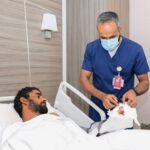Behind every confident specialist in the United Arab Emirates—whether diagnosing patients in a state-of-the-art hospital or leading a complex surgical procedure—is a long and disciplined journey marked by dedication, learning, and perseverance. Becoming a doctor in the UAE is not simply a career choice—it is a calling, shaped by a structured educational pathway and rigorous clinical training.
This article takes an in-depth look at the UAE doctor’s career path—from the first day as a medical student to the pinnacle of specialization. It highlights the stages, challenges, and triumphs that define a medical professional’s growth, offering insight into the lives of those entrusted with the nation’s health.
Stage 1: Medical School – Building the Foundation
The journey begins in medical school, where students gain the foundational knowledge of human biology, anatomy, pathology, pharmacology, and clinical sciences. Aspiring doctors in the UAE may attend local institutions like:
- Mohammed Bin Rashid University of Medicine and Health Sciences (MBRU)
- Khalifa University
- Gulf Medical University
- University of Sharjah College of Medicine
Alternatively, many UAE nationals and residents choose to study medicine abroad, in countries such as the UK, USA, Egypt, India, or Australia, before returning to pursue clinical practice in the Emirates.
Medical education typically spans five to six years, divided into pre-clinical and clinical phases. The latter includes hands-on exposure to hospital environments, where students shadow consultants and start learning the dynamics of real-world patient care.
Stage 2: Internship – The First Clinical Test
Upon graduation, new doctors must complete a mandatory one-year internship, often referred to as the “housemanship” or “intern year.” This is the first time a doctor is actively involved in patient management, rotating through departments like:
- Internal Medicine
- General Surgery
- Pediatrics
- Obstetrics and Gynecology
- Emergency Medicine
Interns work under supervision but are given significant responsibilities, including examining patients, writing notes, assisting in procedures, and responding to medical emergencies.
The internship year is a critical rite of passage. It’s where future specialists decide which field aligns best with their interests, skills, and long-term vision. It also lays the groundwork for professionalism, teamwork, and clinical confidence.
Stage 3: Residency – Deepening Expertise
After internship, doctors must apply to a residency program in their chosen specialty. The UAE offers competitive residency training through government-sponsored programs and leading hospital networks, such as:
- SEHA (Abu Dhabi Health Services Company)
- Dubai Academic Health Corporation (DAHC)
- Ministry of Health and Prevention (MOHAP)
Residency duration varies by specialty:
- Family Medicine: 3–4 years
- Internal Medicine, Pediatrics: 4 years
- General Surgery, Obstetrics-Gynecology: 5 years
- Neurosurgery or Orthopedic Surgery: 5–6 years
Entry into these programs requires passing standardized exams such as the EMREE (Emirates Medical Residency Entrance Exam), along with interviews, CV evaluations, and academic records.
During residency, doctors function as junior specialists, progressively taking on more complex cases under supervision. They attend academic lectures, present clinical audits, participate in journal clubs, and sometimes conduct medical research.
Residency is intense but transformative. Doctors sharpen their diagnostic skills, master procedures, and build the critical thinking needed for independent decision-making.
Stage 4: Licensing and Board Certification
Before practicing independently, doctors in the UAE must secure a professional medical license from one of the main health authorities:
- Dubai Health Authority (DHA)
- Department of Health – Abu Dhabi (DoH)
- Ministry of Health (MOH) for northern emirates
Licensing typically requires:
- Medical degree and transcript validation
- Completion of internship and (if applicable) residency
- Proof of experience
- Passing the Prometric Licensing Exam
Additionally, to become a recognized board-certified specialist, doctors may pursue further exams:
- Arab Board of Medical Specialties
- UK’s MRCP/MRCS or USMLE equivalents
- Saudi Board Certification
Achieving board certification boosts career prospects and is often required for senior hospital roles.
Stage 5: Fellowship – Super-Specialization and Research
Some doctors opt to continue beyond basic specialization by pursuing a fellowship in a sub-specialty. For instance:
- A cardiologist may train further in interventional cardiology.
- A pediatrician may sub-specialize in neonatology or pediatric neurology.
- An internal medicine specialist may study endocrinology or rheumatology.
Fellowships usually last 2 to 3 years and may take place in UAE centers of excellence or abroad through international partnerships. They involve advanced clinical training, teaching, and often research publication.
Doctors who complete fellowships become consultants or senior specialists—leading departments, supervising residents, and handling highly complex cases.
Stage 6: Consultant and Leadership Roles
Reaching the level of consultant is a major milestone. Consultants are recognized experts, authorized to practice independently and oversee entire units. Their responsibilities include:
- Handling critical and referral cases
- Training junior staff and residents
- Participating in clinical audits and research
- Contributing to hospital strategy and policy
Some consultants transition into healthcare leadership roles—becoming department heads, medical directors, or even hospital CEOs. Others move into academia, shaping the next generation of physicians.
Continuous Medical Education: Lifelong Learning
Medicine evolves rapidly, and UAE regulations require doctors to engage in continuous professional development (CPD). Doctors must earn CPD credits annually by attending:
- Conferences and workshops
- Webinars and online modules
- Skills labs and simulation training
- Peer-reviewed research publishing
The aim is to keep doctors updated with the latest clinical guidelines, technologies, and ethical standards.
Support Systems for Emirati and Expat Doctors
The UAE supports both Emirati nationals and expatriates in the medical field through scholarships, grants, and academic alliances with institutions in the US, UK, Europe, and Asia.
- Emirati doctors often benefit from government-funded training abroad.
- Expatriate doctors find career mobility through standardized licensing.
- Female doctors receive tailored support for work-life balance and leadership.
Mentorship programs, specialty societies, and national medical councils ensure a cohesive and high-quality career structure.
Challenges on the Path
Though rewarding, the journey from intern to specialist is not without challenges:
- Workload and burnout during residency years
- High-stakes licensing exams requiring rigorous preparation
- Balancing family life, especially for female doctors
- Navigating inter-hospital competition for limited fellowship spots
- Maintaining emotional resilience in high-pressure environments
Nevertheless, most doctors describe the path as deeply fulfilling—driven by purpose, service, and a desire to make a real difference.
A Day in the Life: Voices from the Field
Dr. Aisha Al Nuaimi, Pediatric Consultant:
“As a medical student, I dreamed of helping children, but I never realized how intense the journey would be. Today, when I counsel a mother with a premature newborn and see her leave the hospital with a healthy child, I know every long shift was worth it.”
Dr. Rohan Mehta, Orthopedic Surgeon:
“I moved to the UAE for residency and stayed because of the opportunities. My career here has taken me from trauma surgeries in the emergency room to leading orthopedic innovation projects. It’s a dynamic space to grow.”
Inspiring the Next Generation
With increasing investment in local talent, Emirati students are more encouraged than ever to pursue medicine. School outreach programs, simulation labs, youth science summits, and mentorship events aim to spark curiosity in health sciences early on.
Medical schools now offer early clinical exposure and structured pathways for high-achieving students, ensuring that the pipeline for future doctors remains strong and diverse.
Conclusion: A Journey of Skill, Service, and Sacrifice
Becoming a specialist in the UAE is more than an academic journey—it is a transformative experience. It is a path marked by self-discipline, sacrifice, and an enduring commitment to serve humanity.
From late-night study sessions to lifesaving decisions in an ICU, UAE doctors are defined not just by their knowledge, but by their resilience, compassion, and vision.
As the country continues to invest in world-class healthcare infrastructure and education, the future of medicine in the UAE looks promising—built on the shoulders of doctors who rise every day with one goal: to heal, to lead, and to leave a legacy of care.








